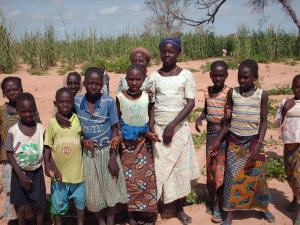An efficient way of addressing food shortages consists in developing out-of-season crops: year-round vegetable and fruit crops, instead of only during the traditional season that starts at the rain season and lasts only four months.
To contribute to the necessary change in mentalities, teachers and students are encouraged to experiment those out-of-season crops at school. The question of access to water is closely linked to that development, as some irrigation is necessary to water the gardens during the dry season.
Since 2009 a school garden has been supported by the decentralised Cesson Dankassari cooperation and the pupils of Beausoleil primary school in Cesson-Sévigné.
Until 2013, it was located in Dankassari the community’s chief town.
Since 2013, the school garden has been located in Dogontapki, a large village. Vegetable plants (cabbage, eggplants, tomatoes… ) are grown, the pupils manure. The vegetables grown there are eaten by the pupils or sold at the market to provide the school with funds (for school supplies). It is associated to a moringa nursery.
A second school garden will start at the end of 2014 in a village of the Matankari rural commune, thanks to the support of the Total Foundation. It is also associated to a moringa nursery.
Since 2020, the goal has been to create and perpetuate one school garden per year in a different village in Dankassari, including regular follow up. Such school gardens have been created in Kamrey and Kolmey, and another is planned in Nakigaza.


